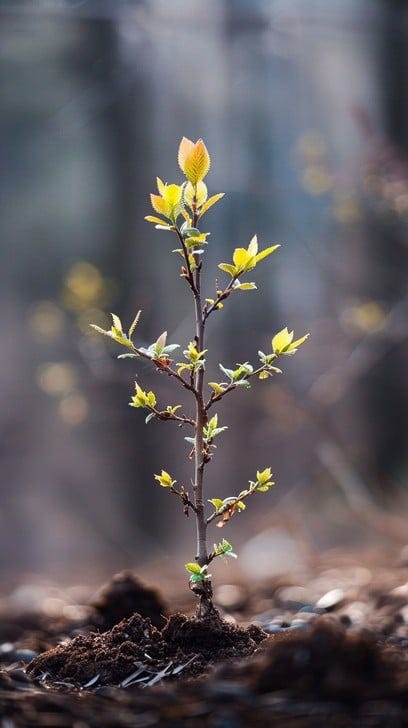The older I get, the more I experience much of the talk about hope as cheap.
The promises of politicians with their visions of greatness feel vacuous.
The motivational pep talks of many preachers ring hollow.
The older I get, the more my eyes must strain toward a glimpse of hope - not the kind peddled in slogans or applause lines, but a hope that rises, quietly, from the compost of loss.
A hope born not in bypassing death, but in walking through it.
A hope that pulses from deeper soil.
Gerard Manley Hopkins is a poet who I return to in times like this. His God’s Grandeur stings with its honest account of (late 19th century) modern life:
Generations have trod, have trod, have trod;
And all is seared with trade; bleared, smeared with toil;
And wears man’s smudge and shares man’s smell: the soil
Is bare now, nor can foot feel, being shod.
Life’s monotony is felt-through in his repetition of “trod” - the lifeless routine, the pervading automaticity of so of much what we do.
His prophetic musing of a life “seared with trade” speaks of an earth desecrated by human exploitation. Our feet insulated from the soil of God’s green earth, where we might even spot (or feel with our toes!) life springing anew.
Humans dulled by utility and noise.
It’s a cry from the heart for ecological and spiritual renewal.
And yet, he continues:
And for all this, nature is never spent;
There lives the dearest freshness deep down things;
Here’s the hinge - the resurrection turn.
Despite everything, creation is not exhausted.
Even beneath the scars, there is an abiding freshness, a sacred resilience. Places of refugia, as author Deb Rienstra reminds us - sacred sanctuaries where life abides, even when death surrounds it.
I’m straining to bear witness to the light in spring rhythms of Resurrection, even as the first seeds sprout out of death and decomposition, even if my tired eyes can barely see the new, greening tree buds after a long Michigan winter. As St. John says, “Unless a grain of wheat falls into the earth and dies, it remains alone. But if it dies, it bears much fruit.” (John 12:24)
I’m allowing myself to pause for a moment when I hear the loud, trumpeting call of a sandhill crane migrating back home again after snow-birding down south for the winter.
As I’m sitting with counseling clients, I’m remembering that so much of the work is ultimately a letting go of what no longer serves. A synaptic pruning is afoot - neural pathways weakening and dying off as new, pathways-of-hope come online. Our brains a testimony to Resurrection life. The tears and fresh smiles of my clients testimonies of renewal and goodness.
I’m reminding myself that this is the pattern - the ancient way of ego death, the dark night before the dawn. The spiritual life is cruciform, inviting us to die to illusions so that we may rise in love.
I’m recalling the biblical politics of death-to-life - how Ezekiel 26-28 and Isa. 23 describe Tyre and Sidon as powerful cities, symbols of wealth and imperial arrogance, ultimately worshipping the gods of economic and spiritual self-sufficiency. The fall of these kingdoms represent the vacuousness of a particular vision of human flourishing, one we’re too-familiar with today.
And I’m bearing witness to John-the-Revelator’s apocalytic vision of Babylon-fallen in Rev. 18 - a vision that ultimately indicts Rome amidst its injustices, too - reminding us that empires that exploit the weak and seduce human beings with promises of wealth and power will be revealed as empty and powerless.
I’m straining to see what Isaiah sees:
“See, I will create
new heavens and a new earth.
The former things will not be remembered,
nor will they come to mind.
18 But be glad and rejoice forever
in what I will create,
for I will create Jerusalem to be a delight
and its people a joy.
19 I will rejoice over Jerusalem
and take delight in my people;
the sound of weeping and of crying
will be heard in it no more.
21 They will build houses and dwell in them;
they will plant vineyards and eat their fruit.
For as the days of a tree,
so will be the days of my people;
my chosen ones will long enjoy
the work of their hands.
23 They will not labor in vain,
nor will they bear children doomed to misfortune;
for they will be a people blessed by the Lord,
they and their descendants with them.
24 Before they call I will answer;
while they are still speaking I will hear.
25 The wolf and the lamb will feed together,
and the lion will eat straw like the ox,
and dust will be the serpent’s food.
They will neither harm nor destroy
on all my holy mountain,”
says the Lord.” (portions of Isa. 65)
Don’t you, like me, long to see?
And so we look and listen, with Hopkins:





